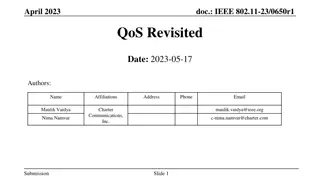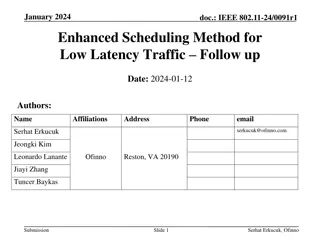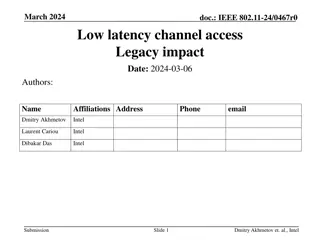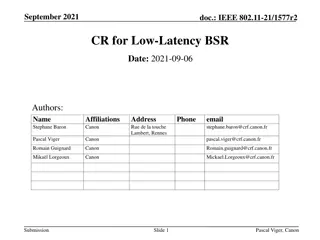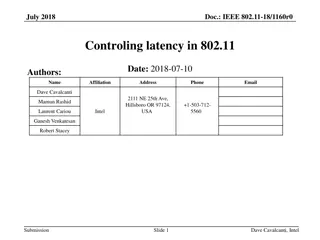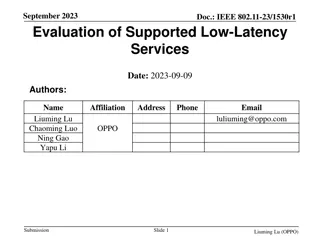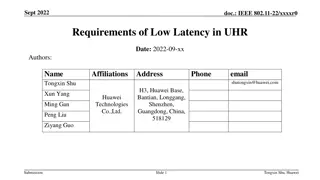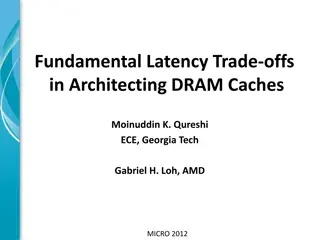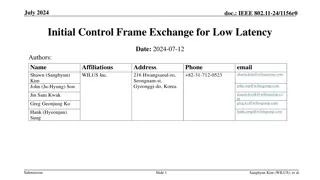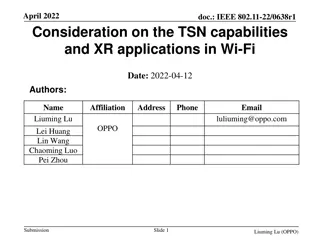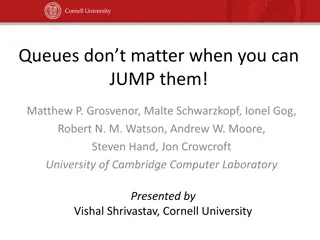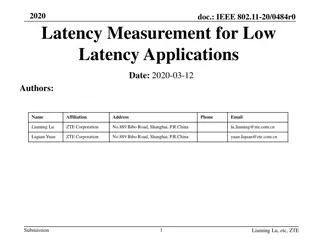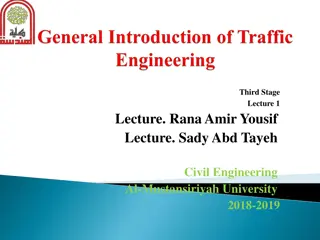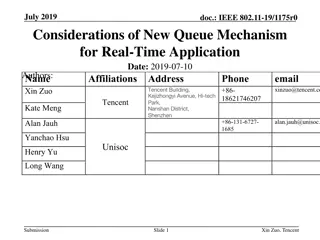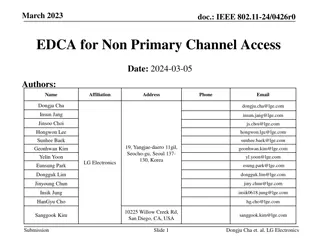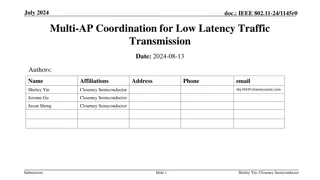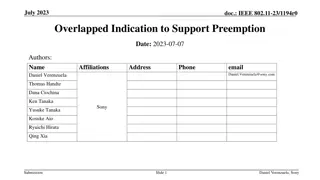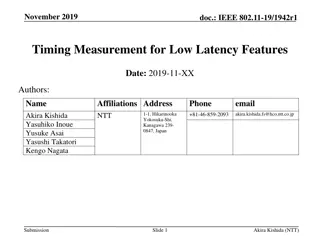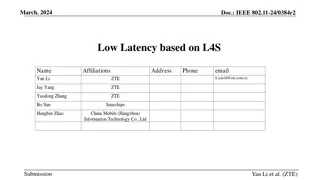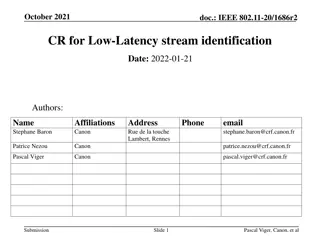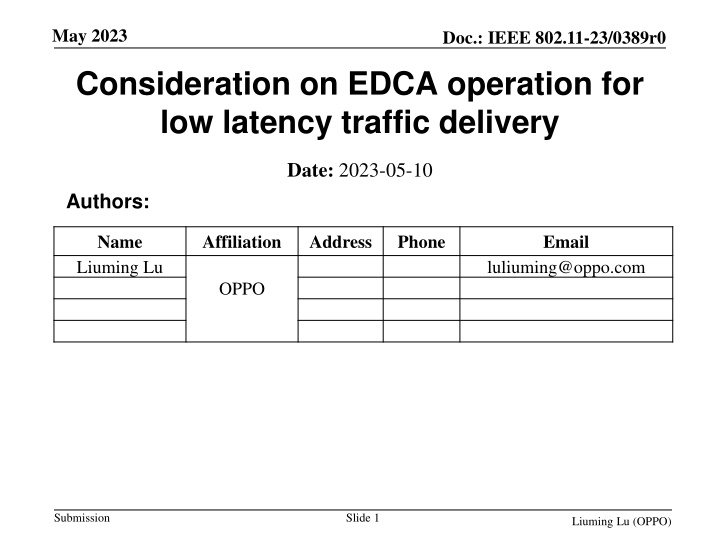
Enhancing WLAN Reliability for Low Latency Traffic Delivery in UHR
Explore the limitations of existing EDCA operation and propose enhanced strategies for low latency traffic delivery in Ultra High Reliability WLAN scenarios, addressing the needs of non-schedulable services such as industrial IoT applications.
Download Presentation

Please find below an Image/Link to download the presentation.
The content on the website is provided AS IS for your information and personal use only. It may not be sold, licensed, or shared on other websites without obtaining consent from the author. If you encounter any issues during the download, it is possible that the publisher has removed the file from their server.
You are allowed to download the files provided on this website for personal or commercial use, subject to the condition that they are used lawfully. All files are the property of their respective owners.
The content on the website is provided AS IS for your information and personal use only. It may not be sold, licensed, or shared on other websites without obtaining consent from the author.
E N D
Presentation Transcript
May 2023 Doc.: IEEE 802.11-23/0389r0 Consideration on EDCA operation for low latency traffic delivery Date: 2023-05-10 Authors: Name Liuming Lu Affiliation Address Phone Email luliuming@oppo.com OPPO Submission Slide 1 Liuming Lu (OPPO)
May 2023 Doc.: IEEE 802.11-23/0389r0 Introduction New applications besides AR/VR have been expected to be supported in UHR, such as robotics, industrial automation for industrial IoT, logistics and smart agriculture. UHR takes enhanced low latency with high reliability and efficient use of the medium as main Objectives enhance WLAN reliability by enabling, in scenarios of an isolated Basic Service Set (BSS) or of overlapping BSSs: improving the tail of the latency distribution and jitter improving efficient use of the medium This contribution points out the limitation of existing EDCA operation for low latency traffic delivery, and proposes that enhanced EDCA operation is specified in UHR Submission Slide 2 Liuming Lu (OPPO)
May 2023 Doc.: IEEE 802.11-23/0389r0 Summary of existing EDCA operation EDCA Operation updates mainly include: EDCA backoff, such as the events which causes an EDCAF to invoke the backoff procedure, rules for deferring transmission The management of EDCA parameters, such as the update of the CWmin[AC], CWmax[AC], AIFSN[AC], and TXOP Limit [AC] state variables for STAs. EHT HE UHR EDCA operation EDCA backoff update EDCA backoff procedures for NSTR operation to avoid expected inferences EDCA backoff rules for R-TWT SP by deferring transmission for particular STAs for some time ? EDCA backoff update EDCA backoff procedures for trigger-based transmission. OBSS PD-based/PSR-based spatial reuse backoff procedure for the medium to be reused more often between OBSSs by interference management The management of EDCA parameters : EPCS EDCA parameters: for EPCS priority access that provides prioritized access to medium for authorized devices(EPCS- enabled STAs) The management of EDCA parameters : MU EDCA parameters : to control the use of EDCA by non-AP HE STAs following particular UL MU HE TB PPDU transmissions Submission Slide 3 Liuming Lu (OPPO)
May 2023 Doc.: IEEE 802.11-23/0389r0 Limitations of existing EDCA operation Currently specified R-TWT prefers trigger-based transmission initiated by the scheduling AP using trigger-enabled R-TWT SPs, and the EDCA operation (i.e. backoff rules) has been specified to provide prioritized access to medium for AP at the start time of R-TWT SPs. Applications limitation The applications of R-TWT operation are limited to schedulable services with latency sensitive traffic which shows periodic pattern with burst arrival of packets in each interval For non-schedulable services which require low latency with high reliability, it is difficult for AP to know the QOS characteristics of the services in advance so that AP cannot immediately schedule the transmission of the traffic for the services. Some industrial IoT application expected to be supported in UHR belong to non-schedulable services. Submission Slide 4 Liuming Lu (OPPO)
May 2023 Limitations of existing EDCA operation (cont.) Doc.: IEEE 802.11-23/0389r0 Currently specified R-TWT prefers trigger-based transmission initiated by the scheduling AP using trigger-enabled R-TWT SPs, and the EDCA operation (i.e. backoff rules) has been specified to provide prioritized access to medium for AP at the start time of R-TWT SPs. Excessive overhead for trigger-based transmission Major sources of overhead include resource allocation (TF and DL MU PPDUs) , and SCS signaling for QoS characteristics of the traffic to be scheduled for transmission. Overhead prevents shorter cycles and/or leaves less time to serve latency sensitive traffic Performance is severely affected by OBSS Interference If the scheduling AP or member STAs incur OBSS interferences during R-TWT trigger-enabled SPs, AP cannot schedule the downlink and/or uplink transmission for the member STAs and the member STAs cannot initiate the uplink transmission by EDCA operation. This would cause unexpected scheduled transmission and low-efficient use of the medium Submission Slide 5 Liuming Lu (OPPO)
May 2023 Doc.: IEEE 802.11-23/0389r0 Requirements of EDCA operation for UHR EDCA operation for low latency traffic delivery Applications to be supported Not limited to schedulable services Non-schedulable services need to be considered Low overhead for the transmission of low latency traffic Not limited to trigger-enabled SPs Non-trigger-enabled SPs need to be considered. Flexible selection of trigger-enabled or non-trigger-enabled SPs based on QoS characteristics of services and network scenario and condition. High efficient use of the medium Spatial reuse to be considered for the medium to be reused more often between OBSSs Reduce invalid transmissions Management of OBSS interference Multi-AP coordination needs to be considered. Submission Slide 6 Liuming Lu (OPPO)
May 2023 Doc.: IEEE 802.11-23/0389r0 Candidate EDCA operation for UHR EDCA operation for low latency traffic delivery 1. The optimization of EDCA operation for spatial reuse during SPs by multi-AP coordination for the medium to be reused more often between OBSSs by interference management Coordination of SR parameters among multiple APs, such as the interfering APs/STAs and/or their allowed transmit power/RSSI. 2. EDCA operation during or outside of SPs for non-trigger-enabled SPs provide prioritized access to medium in use of EDCA operation for member SATs during SPs. control the use of EDCA operation by non-member STAs during SPs Submission Slide 7 Liuming Lu (OPPO)
May 2023 Doc.: IEEE 802.11-23/0389r0 EDCA operation for spatial reuse An example: for the coordination of SR parameters, after the r-TWT setup the TX. power constraint and allowed RSSI of STA1-1 and/or AP1 can be exchanged or negotiated between AP1 and AP2. AP2 can determine which STAs associated with it satisfy the transmission requirements by sounding mechanism or other inter-PPDU sensing method. Submission Slide 8 Liuming Lu (OPPO)
May 2023 Doc.: IEEE 802.11-23/0389r0 EDCA operation for SPs Enhanced EDCA operation considered to be used for member STAs and non-member STAs during SPs: Option 1: prioritized EDCA parameters for member STAs: to provide prioritized access to medium in use of EDCA operation for member STAs during SPs Option 2: deprioritized EDCA parameters for non-member STAs: to control the use of EDCA operation by non-member STAs during SPs Option 3: Enhanced EDCA backoff rules for SPs: to provide enhanced medium access protection and resource reservation mechanisms for delivery of latency sensitive traffic, such as defer the transmission of non-member STAs by EDCA for a time duration during SPs Submission Slide 9 Liuming Lu (OPPO)
May 2023 Doc.: IEEE 802.11-23/0389r0 EDCA operation for SPs (cont.) An example of special EDCA parameters used for member STAs and non-member STAs during SPs Submission Slide 10 Liuming Lu (OPPO)
May 2023 Doc.: IEEE 802.11-23/0389r0 Summary New applications, such as robotics, industrial automation for industrial IoT, logistics and smart agriculture, have been expected to be supported in UHR, and some of the applications belong to non- schedulable services which require low latency with high reliability Currently specified R-TWT prefers trigger-based transmission by the scheduling AP through providing prioritized access to medium for AP at the start time of R-TWT SPs, which seems to be unsuitable for low latency traffic delivery for non-schedulable services Enhanced EDCA operation is suggested to be specified for low latency traffic delivery in UHR Requirements: High efficient use of the medium, management of OBSS interference, low overhead for the transmission of low latency traffic need to be considered. Candidate Features: The optimization of EDCA operation for spatial reuse during SPs by multi-AP coordination EDCA operation during or outside of SPs for non-trigger-enabled SPs 1. 2. Submission Slide 11 Liuming Lu (OPPO)
May 2023 Doc.: IEEE 802.11-23/0389r0 Reference [1] UHR proposed PAR, https://mentor.ieee.org/802.11/dcn/23/11-23-0480-01- 0uhr-uhr-proposed-par.pdf [2] Challenges to achieve low latency, https://mentor.ieee.org/802.11/dcn/22/11- 22-1926-00-0uhr-challenges-to-achieve-low-latency.pptx Submission Slide 12 Liuming Lu (OPPO)
May 2023 Doc.: IEEE 802.11-23/0389r0 SP SP : Do you support to specify enhanced EDCA operation for member STAs and non-member STAs during SPs (especially non-trigger- enabled SPs) for low latency traffic delivery in UHR? Submission Slide 13 Liuming Lu (OPPO)

